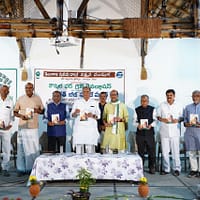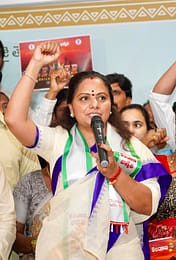Hyderabad: Is Kavitha strategizing to reshape the political landscape of Telangana? Political circles increasingly believe the answer is yes. Over the past few weeks, Kavitha, daughter of former Chief Minister K. Chandrashekar Rao (KCR), has returned to the spotlight. No longer content with being identified merely as “KCR’s daughter,” Kavitha is working diligently to carve out her own political identity while still proudly upholding her father’s legacy.
With a well-devised political roadmap, the Telangana Jagruthi president and MLC is setting her sights on becoming a formidable force in state politics. Much like how KCR led the second phase of the Telangana movement — famously declaring he would meet anyone “from RSS to RSU, and even embrace a scorpion if it helped achieve statehood” — Kavitha appears to be adopting a similar inclusive strategy.
After maintaining a low profile for some time following her release on bail in the Delhi liquor policy case, Kavitha has re-entered public life with renewed focus, this time championing 42% reservations for Backward Classes (BCs). Her campaign is not limited to caste-based issues — she is positioning herself as a people’s leader who will stand up in times of need.
She has already issued an ultimatum to the state government, warning against holding local body elections without ensuring 42% reservations for BCs. Simultaneously, she is calling for unity among BC communities and actively holding the Congress government accountable on this front. Kavitha has declared that any injustice to BCs will not be tolerated.
As part of this campaign, Kavitha has announced a Rail Roko protest on July 17 and is reaching out to political leaders across the spectrum — beyond party lines — to build consensus. Her recent meeting with BJP Rajya Sabha MP and BC leader R. Krishnaiah has garnered attention. She reportedly plans to meet leaders from CPI, CPM, Samajwadi Party, RJD, NCP, RLD, and even key Congress figures such as Mallikarjun Kharge, Sonia Gandhi, and Rahul Gandhi.
To ensure the success of the Rail Roko protest, Kavitha is mobilizing BC organizations and parties likely to support her. Following this, she is also planning to lead a delegation to New Delhi to meet with the President and Prime Minister.
Is Kavitha Mirroring KCR’s Political Blueprint?
During the Telangana movement, KCR crafted a strategic realignment of state politics by weakening opposition parties and absorbing their key leaders. Early on, TDP’s R. Paparao, BJP’s R. Ravindranath Reddy, and MP Ale Narendra joined hands with KCR. Post his 2009 hunger strike, Congress leaders like Jupally Krishna Rao and Dr. T. Rajaiah, and TDP leaders like Jogu Ramanna and Gampa Govardhan, switched to TRS. Prior to the 2014 elections, Congress MPs Dr. Vivek and Manda Jagannatham, along with several former MPs, joined TRS.
Between 2014 and 2023, KCR strategically targeted TDP and Congress, forming alliances and projecting Telangana pride to politically isolate them. Following the U-turn by the Centre on the December 9, 2009 Telangana announcement, KCR launched the Joint Action Committee (JAC) to unite all political forces. On December 23, 2009, leaders met at senior Congress leader Jana Reddy’s residence to officially announce the JAC, which was chaired by Professor Kodandaram. While Congress and TDP later distanced themselves, BJP and other parties remained until the end.
Now, political analysts suggest Kavitha may be reviving this very strategy — building coalitions across castes, parties, and civil society groups. Though many leaders are not openly endorsing her, credible sources indicate she is receiving quiet political support from various quarters. If she fully embraces KCR’s approach, there’s a growing belief that Kavitha could emerge as an unchallenged force in Telangana politics.
However, one key question remains a subject of intense debate in political circles will Kavitha reconcile and align herself with her father KCR and brother KTR? Or will she continue to forge her own independent path?
_ BY senior journalist vinod

















